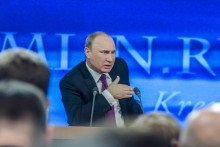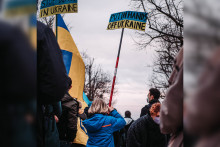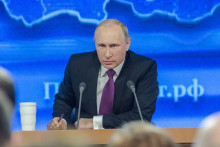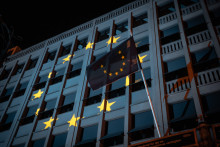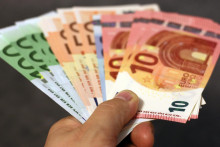At what stage is the war now? ‘Effectively still in its second phase – as I mentioned last week, with war crimes and other atrocities being committed’, says Donnelly. ‘Just look at the so-called ceasefires, followed by evacuation attempts being shelled by Russian artillery. Or proposed evacuation routes leading to enemy territory in Russia or Belarus. That’s not how sparing the population works.’
About Shawn Donnelly
 Shawn Donnelly is Assistant Professor for Technology, Resilience & Europe at the department of Public Administration (faculty BMS). His research specialises in comparative and international political economy, covering public (economic) governance in Europe and globally, with expertise in financial stability, crisis response and resilience.
Shawn Donnelly is Assistant Professor for Technology, Resilience & Europe at the department of Public Administration (faculty BMS). His research specialises in comparative and international political economy, covering public (economic) governance in Europe and globally, with expertise in financial stability, crisis response and resilience.
The UT researcher does see an increase in much-needed help from all sides and in multiple forms flowing towards Ukraine and its neighbours. ‘Be it financial, humanitarian or military aid, it’s definitely helpful. That also goes for the Dutch Giro 555 charity campaign, with a lot of money on the way to Ukraine. Still, that is not enough to drive the Russians back. Military equipment, including portable anti-tank and anti-aircraft missiles, as well as Poland’s transfer of fighter jets are slowing them down, however.’
'Putin says what he wants and he follows up on it, by trying to isolate his victims and threatening nuclear war on those who would help'
Too late
Would a no-fly zone work, as pleaded for by Ukraine’s president Volodymyr Zelensky to the NATO? ‘Ironically, it’s too late for that now in central and eastern Ukraine, where Russian forces are already active’, says Donnelly. NATO and Russia would then be in direct combat, with all the consequences that follow. ‘There were voices within NATO on that question saying that they couldn’t take it any further than the economic sanctions currently imposed on Russia. But others – like Poland and the Baltic states – argued that NATO could have declared Ukraine as a non-member country of vital interest as it did with Afghanistan. Then it could have proclaimed Ukraine as a no-fly zone, and provided ground troops and equipment before the Russians invaded Ukraine on the 24th of February. That’s one debate that’s going on right now: should NATO have done more when it could? And what about Sweden and Finland, outside the alliance, but closely aligned?’
According to Donnelly, Putin’s motives are clear: ‘He wants the old Soviet Union back, with the post-1945 border reinstated. After Ukraine, he’ll want to reclaim the Baltic states. Plus he’s already threatening to do the same with Sweden and Finland. He says what he wants and he follows up on it, by trying to isolate his victims and threatening nuclear war on those who would help. The threat is real and we should do more about it by protecting other countries and citizens before he’s able to move. What I’m currently seeing is continuing denial about the extent of the threat, of how far Putin will go, even with other experts in talk shows on Dutch tv. But we’re really in a contest for survival with Putin.’
'The Netherlands have a tradition of financing one thing by taking away money from somewhere else'
Hurting or helping?
Although Donnelly did already see an important first step from European countries moving towards – what the EU calls – ‘strategic autonomy’, he also says that ‘we’re not there yet’. ‘It’s going to be interesting to see how Dutch minister of finance Sigrid Kaag will respond. Will the Netherlands be borrowing money to finance its defense infrastructure, or will it be by raising taxes? She’s already shown some reluctancy, saying that we can’t change our fiscal rules to start borrowing money. That is an incredibly unhelpful thing to say. She can either help or hurt the European strategic autonomy. But I fear she may hurt it.’
To build this strategic autonomy, Donnelly thinks the EU and its member states should start collectively borrowing more money. ‘Borrow in the short term, tax in the long term. The Netherlands have a tradition of financing one thing by taking away money from somewhere else. This country’s purchase of F35 fighter jets went directly at the expense of the financing of daycare, healthcare and universities, for instance.’
'Know that strong countries with expansionary tendencies will continue being hostile and expand'
Using the money borrowed to properly invest in companies, communities, infrastructure and equipment would be the best way forward, says the UT researcher. ‘If you want and need defense, you have to pay for it. And there are more investment destinations to think of, complementary to defense investments. Invest in the energy transition, to become less dependent on fossil fuels from Russia, invest in high tech and in industry, to generate both industrial and military capacity, and in healthcare. It’s challenging, sure. But it’s a challenge that will pay off in the long term.’
Offensive realism
All in all, the war in Ukraine also requires debate over whether we require a soft or a hard approach to security, says Donnelly. ‘When people reflect on this, some say that we should continue to rely on interdependence and sanctions, rather than costly military competition and war. That’s the more recent West European – and softer – approach. A different outlook would be to see things from the perspective of offensive realism: know that strong countries with expansionary tendencies will continue being hostile and expand – especially towards neighbouring countries, until they are stopped. Now, the question is how to stop them.’


